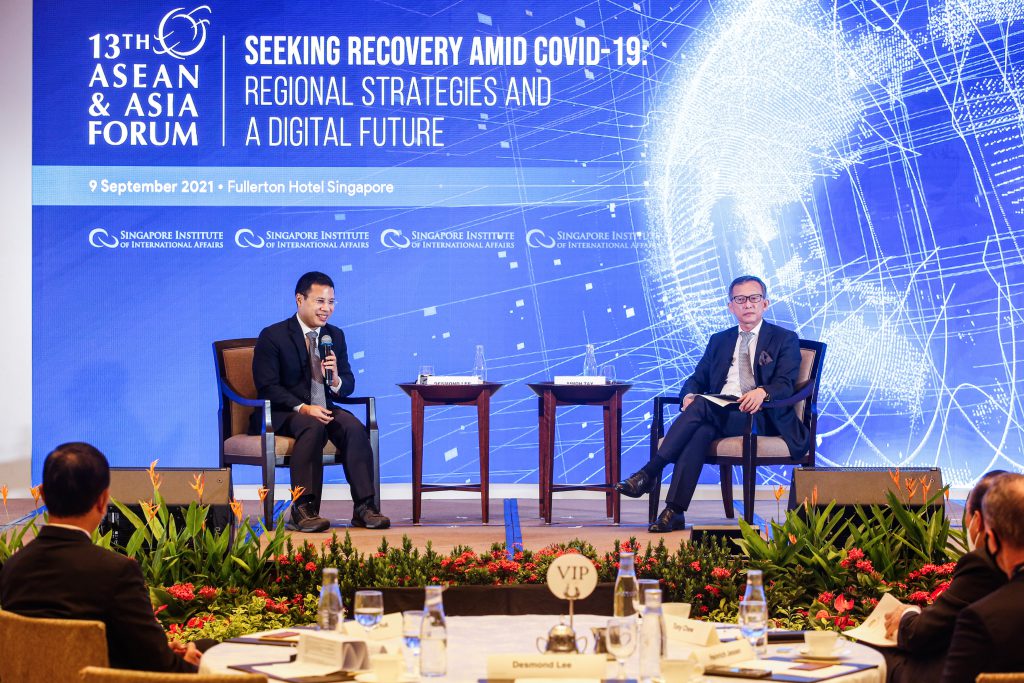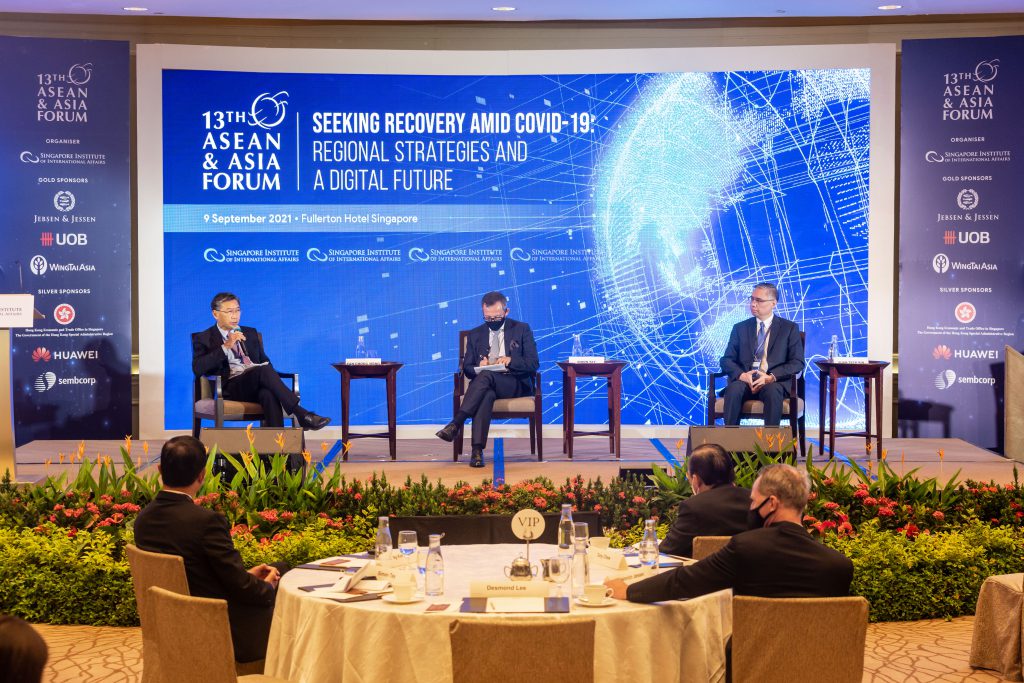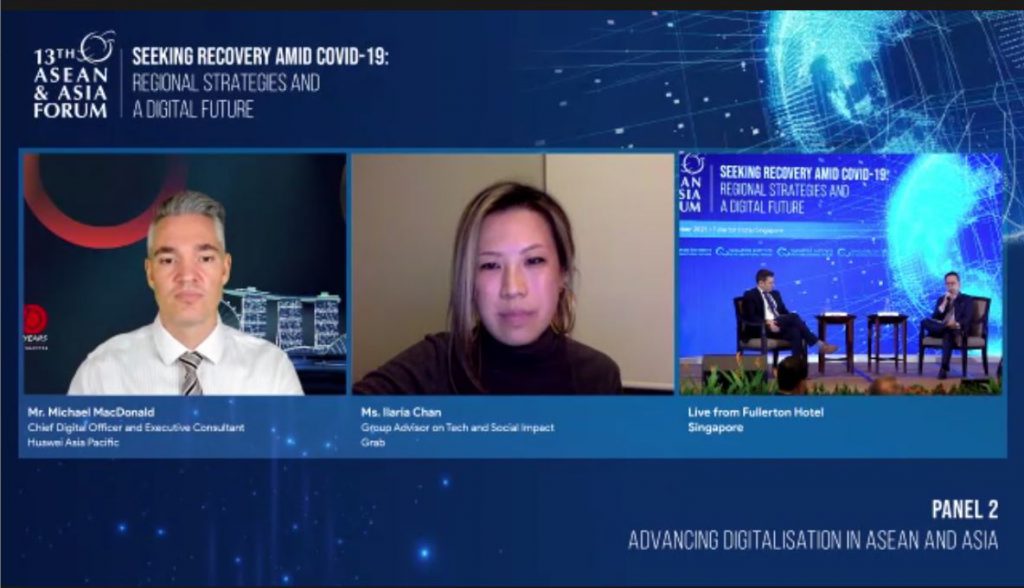The COVID-19 pandemic has radically altered our lives and livelihoods. Countries in the ASEAN region still face perennial problems such as coping with more infectious variants of the COVID-19 virus and struggling with the economic fallout, including income inequality amongst other challenges. At the same time the pandemic has accelerated the adoption of digital technology worldwide and has become an integral part of the way we live. Despite the many challenges that ASEAN countries contend with when shifting into the digital economy, the outlook for the region remains bright as the regional market is young, dynamic, resource-rich and has significant manufacturing capabilities. This was the key message from the 13th ASEAN and Asia Forum (AAF) organised by the Singapore Institute of International Affairs (SIIA). The 13th AAF was sponsored by – Gold sponsors: Jebsen & Jessen, UOB and WingTai; and Silver sponsors: Hong Kong Economic and Trade Office in Singapore, The Government of the Hong Kong Special Administrative Region, Huawei and Sembcorp.
The 13th AAF was themed, “Seeking Recovery amid Covid-19: Regional Strategies and a Digital Future”. Held on 9 September 2021, the hybrid forum attracted some 200 C-suite executives, industry leaders and policy makers from across the globe.
Here are some key takeaways from the discussion. Video excerpts from the webinar will be posted on social media, with a full recording available as premium content for the SIIA Roundtable and Corporate Members.

In his opening address, keynote speaker, Mr Desmond Lee, Minister of National Development, Minister-in-charge of Social Services Integration and Co-Chair of the Emerging Stronger Taskforce (EST), Mr. Lee underscored two overarching themes of the forum which were resilience and sustainability. He stressed that resilience is essential in tackling immediate challenges precipitated by COVID-19 and sustainability is equally pertinent in mitigating long-term threats posed by global and existential issues like climate change. Mr. Lee also outlined three recommendations for Singapore to incorporate in its economic reopening. First, to physically reconnect with the world, safe means of travel must first be procured. Second, physical connections with our neighbours need to remain robust amidst current and future crises, and we must supplement physical links with digital ones. Lastly, Singapore must be innovative in sourcing for new ways to forge mutually beneficial partnerships with neighbouring countries in the region.
The first panel titled, “Southeast Asia’s Recovery Path – The Pandemic, Problems and Prospects” delved into the pressing challenges the region faces, primarily the slow vaccination rate across most ASEAN countries which adversely affects manufacturing and the economy. There have also been disruptions to connections between countries including supply chains which are crucial for ASEAN countries that are resource-based and rural economies. The challenge will be to enhance economic infrastructure which includes facilitating the transition from rural to consumption-driven economies and equipping the younger generation with relevant business knowledge and capabilities.
The panellists included Mr Tan Chong Meng, Group Chief Executive Officer of the Port of Singapore Authority (PSA) and Co-chair of Emerging Stronger Taskforce (EST); and Mr Suan Teck Kin, Executive Director and Head of Research, Global Economics and Markets Research, United Overseas Bank (UOB). The session was moderated by Professor Simon Tay, Chairman of SIIA.

The second panel, “Advancing Digitalisation in ASEAN and Asia” focused on the role of digitalisation for COVID-19 recovery within the region. The panel highlighted challenges and opportunities arising from the digital infrastructure realm and the digital talent landscape in ASEAN. Aside from discussing the indispensable role of digitalisation in today’s world, the panel brought up the likelihood of US-China relations improving and how that would affect the digital space. The panellists were largely optimistic on that front and reiterated that US’ reengagement in the region is much welcomed and would benefit ASEAN greatly. However, the region needs to have an open and outward approach by linking with like-minded ASEAN or APEC countries to promote interoperable digital trade frameworks.
Panellists included Mr Ben King, Country Director, Google Singapore; Mr Michael MacDonald, Group Chief Digital Officer and Executive Consultant, Huawei Asia Pacific; and Ms. Ilaria Chan, Group Advisor on Tech and Social Impact, Grab. The session was chaired by Mr. Ho Suu Wei, APAC Public Policy and Economic Graph Director, LinkedIn, and Senior Fellow, SIIA.

Prior to the pandemic, companies were only beginning to embark on the digitalisation journey to boost supply chain efficiency. Now, digitalisation has become an integral part of economic recovery and in some sectors, even business survival. With more users across the region coming online and shifting into the growing digital economy, businesses must move into the digital space as well to meet the rising demands of online consumers. While companies may find it challenging to establish a digital presence, it has become imperative for businesses to traverse the digital gap and seize opportunities arising from this new economy. Therefore, despite COVID-19 and digitalisation issues hampering ASEAN’s regional development, when looking ahead, ASEAN countries remain competitive especially in the trade and investment sector with ASEAN maintaining its status as an investment-attractive region. For trade, countries like Indonesia and Vietnam are still progressing well albeit staggering vaccination rates. Singapore can capitalise on such regional prospects and act as an intermediary to facilitate trade relations between ASEAN countries and other regional or global partners.




